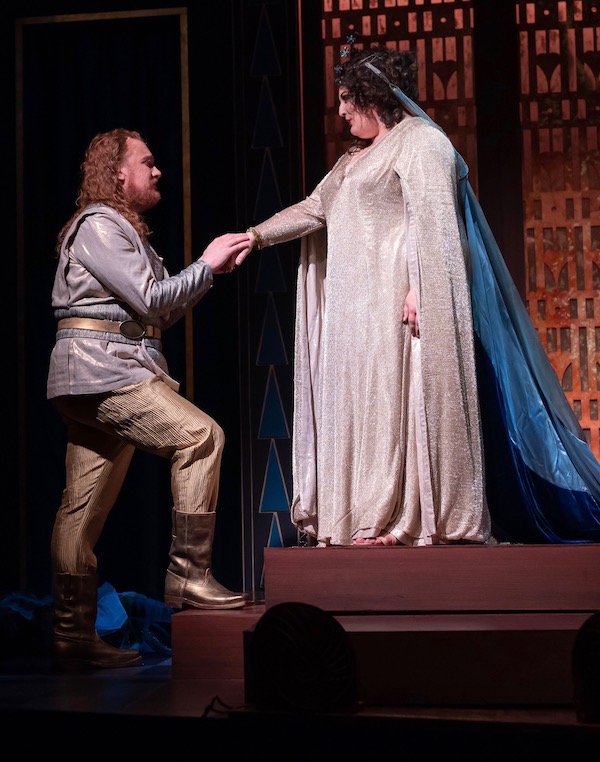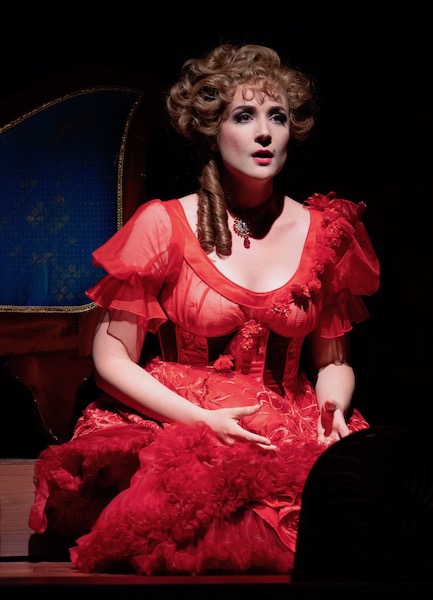Wolf Trap’s “Ariadne” offers effervescent treat in the dog days of summer

It’s a desert island summer for the intrepid Wolf Trap Opera Company. This year’s programming at the Barns, the first under the leadership of Lee Anne Myslewski but still planned by her predecessor, Kim Pensinger Witman, opened with a double bill of Gluck’s Merlin’s Island and Ullmann’s The Emperor of Atlantis last month. Strauss’s magnificent, quirky Ariadne auf Naxos took the stage this week.
Strauss might seem like an odd choice for a company that features developing singers, but Wolf Trap has presented Ariadne before, back in 2008. The opera features a large cast with a broad range of voice and character types. Strauss and his librettist von Hoffmansthal adapted their short work on the story of Ariadne marooned on Naxos by Theseus, which becomes part of a zany mash-up performance involving an improvising group of opera buffa performers.
The opera requires four top-notch voices that carry most of the score’s dramatic weight, and this cast fit the bill in almost every way at Wednesday night’s performance.
At the top reigned Alexandria Shiner, whose musical and dramatic range has already made quite an impression in her work at Washington National Opera over the last two seasons. The dramatic soprano, who hails from Waterford, Michigan, crowned the musical climaxes of the second act with potent strength and a creamy vocal finish. She was also incredibly funny as the eye-rolling diva behind the scenes in the first act.

“Ariadne auf Naxos.” Photo: Scott Suchman
Her foil was the sparkly Zerbinetta of soprano Alexandra Nowakowski, who also stood out in the WNO Domingo-Cafritz Young Artist program in the last two years. She finessed the coloratura demands of the aria “Grossmächtige Prinzessin” with panache and airy nuance, as refreshing as a gin fizz. These paired characters also represent Strauss’s love of all sides of the soprano voice, tragic and comic, and in this opera Zerbinetta wins the composer’s heart. Nowakowski also brought strength and sincerity to the touching duet with the Composer in the first act.
On its surface Ariadne is rather silly, but do not let the tomfoolery fool you. Strauss created a complex double self-portrait in the opera, contrasting the seasoned Music Master of commanding baritone Joshua Conyers, who has seen it all and understands that artistic compromise is necessary, with his pupil, the idealistic Composer. The latter, sung with puissant verve by mezzo-soprano Lindsay Kate Brown, initially rejects any combination of his work with the comic troupe’s in a fit of pique over the sanctity of high art.
Ian Koziara was funny as the vain Tenor in the first act, and he certainly had the top notes for the role of Bacchus that powers the opera’s climax, although his middle range displayed an oddly muted quality. In the supporting cast, noteworthy contributions came from the enthusiastic Lackey of bass Jeremy Harr and the physical humor of Bethesda-born character tenor Ian McEuen as the Dancing Master.
The quartet of men who accompanied the exploits of Zerbinetta made a finer ensemble than their solo bits, while the Dryade of mezzo-soprano Anastasiia Sidorova stood out at the bottom of the excellent trio of Ariadne’s attendants in the second act.
Emily Senturia was more journeyman than inspiring leader at the podium, with some control issues reminiscent of her last-minute substitution at Washington National Opera last year. The lack of confidence at the helm seemed to filter into the orchestra, where solo contributions in the strings and horns were not always up to snuff. The placement of the musicians, chamber-sized but still too large for the small pit of the Barns, at the back of the stage, cramped the stage space and seemed to affect communication with the singers.
The production directed by Tara Faircloth made clever use of the proscenium area, separated from the orchestra in both acts by a diagonal wall (scenic design by Laura Fine Hawkes). The colorful costumes by Rooth Varland anchored the action in the time of the opera’s premiere, in the years leading up to World War I. Faircloth’s direction, especially the use of small “offstage” areas in the wings in the second act, brilliantly walked the line required by the opera, with slapstick parody that did not get in the way of the exalted moments in the score.
Ariadne auf Naxos runs through July 27. wolftrap.org; 877-965-3872


